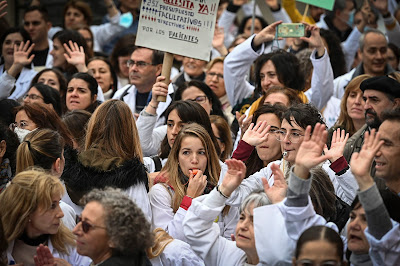El problema de la Atención Primaria madrileña no se pueda arreglar en una mesa sectorial en la que estén sentados la administración y un sindicato. Es demasiado complejo. Trataré de simplificarlo en dos minutos:
1. Tras años de infrafinanciación las platilla de pediatras y médicos de familia está exhausta.
2. Los médicos residentes jóvenes abandonan Madrid, los médicos mayores que pueden también.
3. En cinco años se jubilan un 25% de los médicos de familia actuales.
4. La sobrecarga es inmensa: vacantes no cubiertas de larga duración (20% de toda la plantilla) + ausencias por permisos e IT (9%). Esto implica que además de una agenda de pacientes amplia hay que asumir por sistema una media de un 30% más de trabajo permanentemente, con picos de variable duración.
5. Los datos de burnout y malestar psicológico de los profesionales son más altos que nunca.
Consecuencia: la situación es insostenible.
¿Qué se puede hacer?
1º. Asumir lo que hay. La situación es crítica y es fundamental que tanto los profesionales como la ciudadanía lo asuman.
2º. Pedir a los partidos políticos de Madrid que hagan propuestas presupuestarias y de organización (dejo ejemplo de ayer en este hilo de Javier Padilla).
3ª. Plantear un debate en la Asamblea de Madrid que busque un consenso de mínimos.
4º. Pedir a los partidos políticos nacionales y al Gobierno una estrategia de fortalecimiento de la Atención Primaria que incluya partida presupuestaria.
Los médicos de familia llevamos años perdiendo (salud mental) y los ciudadanos cada vez van a perder más (pueblos y barrios desfavorecidos sin médicos, más listas de espera, peor servicio).
Ha llegado la hora de asumir que la Atención Primaria es un servicio básico esencial que requiere financiación prioritaria o asumir que como sociedad nos quedamos sin pediatras y médicos de familia públicos.
Por favor dediquen unos minutos a ver este vídeo de Vicente Baos: https://t.co/NM7aSdbXG5
https://twitter.com/javierpadillab/status/1595013307890647041
The solution for Primary Care in Madrid.
The problem of Madrid's primary care cannot be solved in a sectoral round table where the administration and a trade union are seated. It is too complex. I will try to simplify it in two minutes:
1. After years of underfunding the workforce of paediatricians and family doctors is overstreched.
2. Young resident doctors are leaving Madrid, and so are the older doctors who are able to do so.
3. In five years 25% of the current family doctors will retire.
4. The overload is immense: long-term unfilled vacancies (20% of the entire staff) + absences due to leave and IT (9%). This means that in addition to a large patient schedule, an average of 30% more work has to be taken on permanently, with peaks of varying duration.
5. The figures for burnout and psychological discomfort among professionals are higher than ever.
Consequence: the situation is unsustainable.
What can be done?
1. Assume what is there. The situation is critical and it is essential that both professionals and the public accept it.
2º. Ask the political parties in Madrid to make budgetary and organisational proposals.
3ª. To propose a debate in the Assembly of Madrid that seeks a minimum consensus.
4º. Ask the national political parties and the government for a strategy to strengthen primary care, including a budget allocation.
Family doctors have been losing out for years (mental health) and citizens are going to lose more and more (disadvantaged villages and neighbourhoods without doctors, longer waiting lists, worse service).
The time has come to accept that primary care is an essential basic service that requires priority funding or to accept that as a society we are running out of paediatricians and public family doctors.
马德里初级保健解决方案。
自动翻译,请原谅错误。
马德里的初级保健问题不能在行政部门和工会坐镇的部门会议上解决。它太复杂了。我将尝试在两分钟内将其简化。
1.经过多年的资金不足,儿科医生和家庭医生的劳动力已经耗尽。
2. 年轻的住院医生正在离开马德里,有能力的老医生也在离开。
3. 五年后,25%的现有家庭医生将退休。
4. 超负荷工作是巨大的:长期未填补的空缺(占整个工作人员的20%)+由于休假和IT的缺席(9%)。这意味着,除了大量的病人日程安排外,平均还要长期承担30%的工作,并有不同的高峰期。
5. 专业人员中的职业倦怠和心理不适的数字比以往任何时候都高。
后果:这种情况是不可持续的。
可以做什么?
1. 假设有什么。情况很危急,专业人士和公众都必须接受这个事实。
2º. 要求马德里的各政党提出预算和组织建议。
3ª. 建议在马德里大会上进行辩论,寻求最低限度的共识。
4º. 要求国家政党和政府制定加强初级保健的战略,包括预算拨款。
家庭医生已经失去了很多年(精神健康),公民将失去越来越多的东西(处境不利的村庄和社区没有医生,等待名单更长,服务更差)。
现在是时候接受初级保健是一项需要优先供资的基本服务了,或者接受作为一个社会,我们正在耗尽儿科医生和公共家庭医生。


.png)


.jpeg)









.png)









